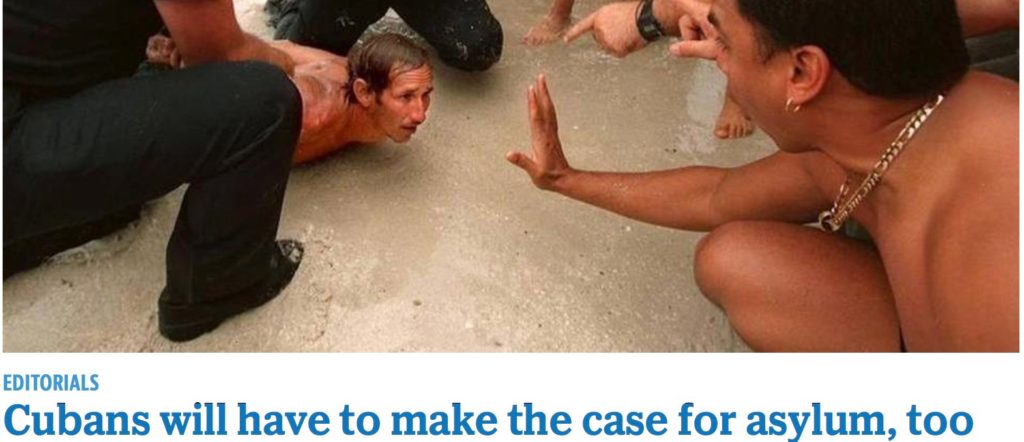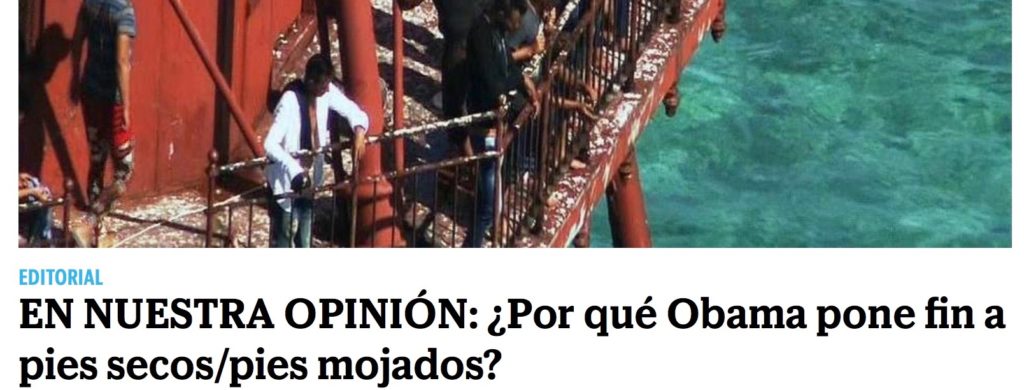
Fair decision or foul concession? The 2 Heralds differ.
As so often before, Miami’s two Heralds are putting different spins on the news that President Obama has called an end to the wet-foot-dry-foot policy (WFDFP) maintained by the United States toward Cuba since 1995.
In editorials on Friday (Jan. 13), both newspapers express differing opinions on the significance of Obama’s decision, with the English-language Herald accepting it almost ruefully and the Spanish-language Nuevo decrying it loudly.
[To read the Miami Herald editorial titled ‘Cubans will have to make the case for asylum, too’, click here. To read the El Nuevo Herald editorial (in Spanish), click here.]

The Herald concedes that the WFDFP has been “preferential — and some would say unfair –” treatment for Cuban refugees, but that it is also “a natural outcome of the new relationship with Cuba” established in December 2014 by presidents Obama and Raúl Castro to curtail illegal shuttling between the two countries by economic “refugees.”
The Herald recognizes it as what it is: an abuse of the existing laws. “This ends the abuse,” it states categorically.
The editorial then reminds the reader that “Cubans can still seek political asylum — but, just like asylum seekers from other countries, they must prove political persecution if they hope to stay.”
“It’s only fair,” it acknowledges. And, in an allusion to the flood of Cubans who have attempted to enter the U.S. from third countries, it points out that the end of WFDFP “will stanch the flow of refugees who have made the arduous trip from Cuba through Latin America, so much of it on foot, in anticipation of the policy ending.”
The Herald has one quibble: “We question [Obama’s] timing.” Well, there’s little time between now and Jan. 20, when Obama will leave office. Much work needs to be done between Havana and Washington regarding enforcement of the president’s executive order, such as who will be repatriated (or exchanged), how and when. What is there to question about the timing?
Quibble or not, The Herald concludes that the end of the WFDFP “leaves the United States with a fairer, more consistent immigration policy.” Fair enough.

In contrast, El Nuevo Herald’s editorial demands to know (in its headline) “Why does Obama put an end to dry-feet-wet-feet?” And it throws into the pot the Parole for Cuban Doctors program that President George W. Bush established in 2006 to drain the medical brains of Cuba and hobble the island’s health system.
While acknowledging that shuttling between the two countries by economic “refugees” is a practice that “has been abused lately,” El Nuevo asks “what’s the hurry in [Obama’s] final days in the presidency”?
The “why” was explained clearly in Obama’s announcement, and so was the timing. A joint statement from Washington and Havana also makes it clear, in great detail.
Eliminating the WFDFP was “a concession to Cuban ruler Raúl Castro,” El Nuevo concludes. Wrong. It was a wise solution to a festering problem.
As President Obama wrote in his statement, allowing orderly and legal migration between both countries “is the best way to ensure that Cubans can enjoy prosperity, pursue reforms, and determine their own destiny. As I said in Havana, the future of Cuba should be in the hands of the Cuban people.”


